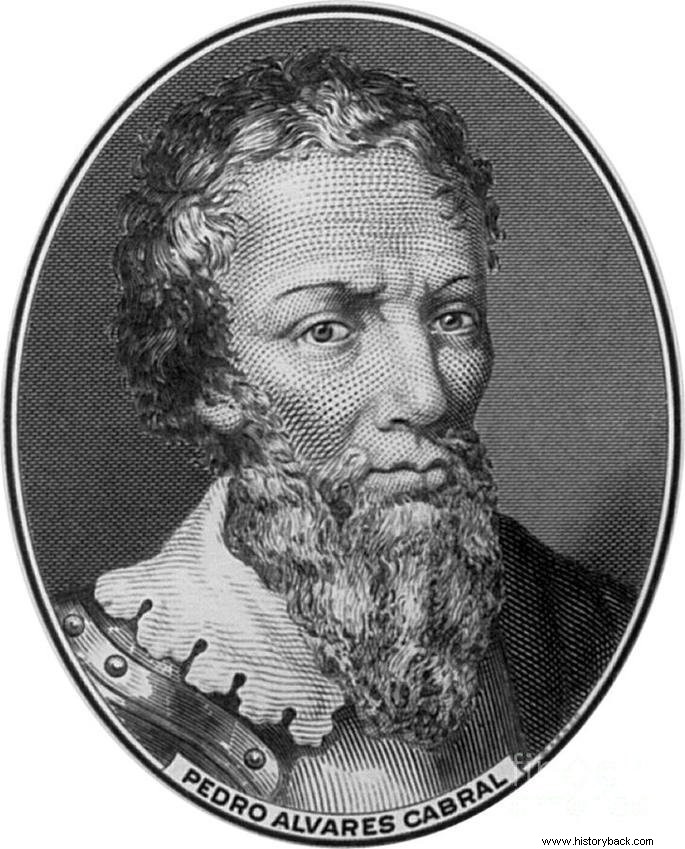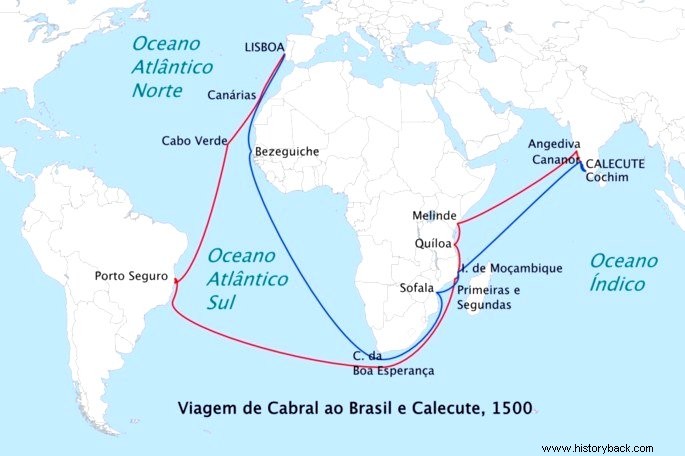Pedro Álvares Cabral was a Portuguese navigator and explorer responsible for finding, in 1500, the lands belonging to Brazil.
He was born in 1467 at Belmonte Castle, in Beira Baixa, Portugal. His family, the Cabrais, was an ancient and wealthy Portuguese noble family.
The Cabrais were of the lineage of Carano, the legendary first king of Macedonia who, in turn, was a descendant of the Greek demigod Hercules.
The Cabrais coat of arms is represented with two purple goats - from which the family name originates, in a field of silver. Purple stands for faithfulness and goats for humility.

As a young man, Cabral was taken to reside in the interior province. There he received a good education, studying subjects such as human sciences and armed tactics, under the tutelage of the court masters of Afonso V.
His rise began when, at age 16, D. João II named him a nobleman. He was also a Portuguese military commander, navigator and explorer, probably the first European in Brazil.
He acquired great experience in navigation and diplomacy. But, after accomplishing his greatest deeds, he will decline the king's preference in favor of Vasco da Gama, at which time he retires from public life.
Pedro Álvares Cabral was married to D. Isabel de Castro, and died in 1520 in Santarém, where he lived during his last years. The cause of his death is not known.
Cabral's achievements were forgotten for centuries. After the Independence of Brazil, in the 19th century, his exploits were reaffirmed by Emperor Pedro II of Brazil himself, an erudite and scholar of History subjects.
In this regard, it is worth remembering that historians differ as to whether Cabral actually discovered Brazil on purpose or accidentally, as the records indicate.
Main achievements of Pedro Álvares Cabral
As Vasco da Gama was successful in reaching the Indies in 1498, the possibility of profits by exploring the new trade route to the east became clear.
Thus, Pedro Álvares Cabral is commissioned by King Manuel I of Portugal to command the second expedition to the Indies, in the year 1500. At the age of 33, a large fleet composed of 13 ships and more than a thousand men, Cabral began his voyage .
A few years earlier, Christopher Columbus had already arrived on the American continent, more precisely in 1492.
Cabral's expedition arrived in Calicut on the 15th of September, where they were met by fire and iron by the Hindus.

The locals were defeated and subjugated, but at the cost of several vessels, including that of Bartolomeu Dias. Bartolomeu Dias was another prominent figure of this period, as he was shipwrecked near the Cape of Good Hope, survived and crossed the continent until returning to Portuguese dominions.
However, even with all the damage to human lives and ships, Cabral's mission was considered a success. This was due to the profits that preceded it, referring to the new trade route for spices.
The objective of this enterprise was to break the monopoly of the Italians and Arabs for the lucrative spices. At the same time, it was to form and consolidate commercial and diplomatic relations in India.
Discovery of Brazil
Under the guidance of Vasco da Gama, Cabral tried to circumvent the Cape of Good Hope, but he made the famous south-west detour that scholars have discussed so much. Thus, on April 22, 1500, he reached the Brazilian coast. This event was registered as the "discovery" of Brazil.
The territory was named at first sight as Monte Pascoal, due to the relief formations that emerged near the coast of Bahia.
The Portuguese did not attach much value to the discovered territory, as they had another focus, as they were looking at that time for a viable trade route to the East.
It is worth noting that the new territory was within the Portuguese limits of the Treaty of Tordesilhas, which allowed the Portuguese Crown to claim those lands.
The year he arrived in Brazil, Cabral ordered the immediate dispatch of a ship commanded by the best navigator of the fleet to Portugal, to bring the King the news of the discovery.
Read Also :
- Discovery of Brazil
- Arrival of the Portuguese in Brazil
- Treaty of Tordesillas
- Bartolomeu Dias
